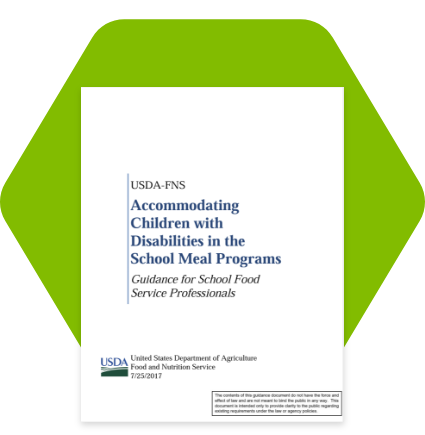You are here
Civil Rights

Child Nutrition program operators and sponsors must follow all civil rights regulations to ensure all eligible persons receive program benefits in a non-discriminatory manner. Civil rights are the nonpolitical rights of citizens; the rights of personal liberty guaranteed to U.S. citizens by the 13th and 14th amendments to the U.S. Constitution and acts of Congress.
Jump To:
Civil Rights Training
Training Guides
- Self-Study Guide in English
- Self-Study Guide in Spanish
- Meals in the Classroom Teacher Training Memo
Training Videos and Webinars
This recorded webinar covers the civil rights requirements in the Child Nutrition programs and satisfies the annual civil rights training requirements.
Civil Rights - English:
Civil Rights - Spanish:
Non-Discrimination Statement & And Justice for All Poster
Nondiscrimination Statement
And Justice For All Poster
*Note: Sponsors may print and post the current And Justice for All Poster until new posters are distributed
Civil Rights Complaints
Summer Food Service Program Civil Rights
The following resources are only applicable to the Summer Food Service Program.
Special Dietary Needs
USDA's non-discrimination regulation (7 CFR 15b) and the regulations governing NSLP and the School Breakfast Program mandate that substitutions to the regular meal must be made for children who are unable to eat school meals because of their disabilities when that need is certified by a licensed physician.
Overview information:
- Accommodating Children with Disabilities in the School Meal Program (USDA)
- USDA Non-Dairy Beverage Nutrient Requirements
What School Employees Need to Know:
Medical Statement Forms
- Medical Statement Instructions and Requirements: English
- Medical Statement for Meal Modification: English, Spanish
- Dietary Preference Form for Meal Modification: English, Spanish
- Discontinuation Form: English, Spanish
Letters to Parents

Fluid Milk Substitutes
Non- Disability
Fluid milk substitutes must be nutritionally equivalent to milk. The nutrient standards for non-dairy milk substitutes are outlined in the table below.
Nutrition Requirements for Fluid Milk Substitutes
| Nutrient | Per Cup (8 fl oz) |
| Calcium | 276 mg |
| Protein | 8 g |
| Vitamin A | 150 mcg retinol activity equivalents (RAE) |
| Vitamin D | 2.5 mcg |
| Magnesium | 24 mg |
| Phosphorous | 222 mg |
| Potassium | 349 mg |
| Riboflavin | 0.44mg |
| Vitamin B-12 | 1.1 mcg |
Fluid Milk Modifications for Disability
Program operators are required to provide fluid milk substitutions requested due to a disability. To receive reimbursement when a modified meal related to a disability does not meet the meal pattern requirements, a written medical statement signed by a state licensed healthcare professional or registered dietitian must be on file. Therefore, a medical statement is required if the milk substitute requested does not meet the nutritional standards of cow’s milk as described above. The medical statement must provide information about the participant’s dietary restrictions, such as foods or beverages to be omitted and recommended alternatives.



Connect With Us





